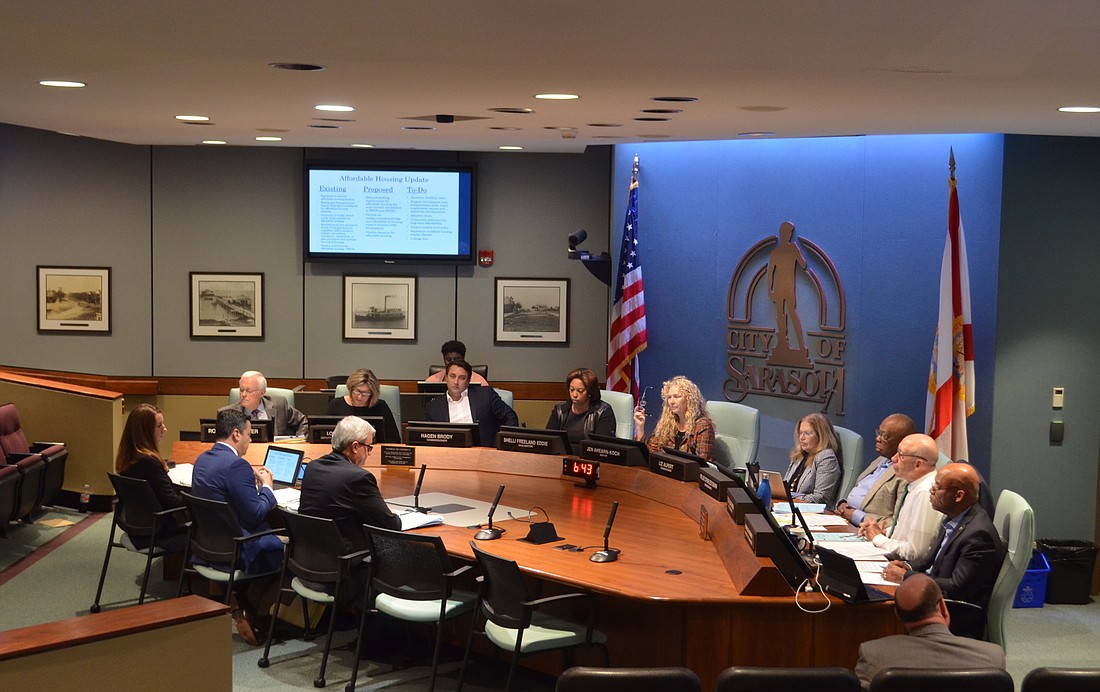- December 26, 2024
-
-
Loading

Loading

The City Commission held a wide-ranging 70-minute discussion of affordable housing at a workshop Monday, using a less formal setting to dig deeper into an issue officials have identified as a major priority.
Although a presentation at the workshop centered on three specific policy initiatives staff hoped to advance in the near term, commissioners took the opportunity to address a variety of topics related to affordable housing.
Mayor Jen Ahearn-Koch questioned proposed affordability thresholds based on incomes. Commissioner Willie Shaw advocated for more single-family housing poor residents could realistically buy. Commissioner Hagen Brody defended the value of higher-density apartment projects targeted at residents making at or above the area median income. Commissioner Shelli Freeland Eddie asked whether the city’s proposed incentives were sufficient to get developers to build affordable units.
As the conversation concluded, the commission arrived at a decision: It wasn’t ready to vote on the policy initiatives staff was working on. Instead, the board wanted another workshop in February.
The discussion highlighted the city’s interest in addressing a shortage of affordable housing and the challenge of taking on a complex issue. Planning staff and outside experts say there’s no single solution for creating an environment that better facilitates the production of affordable housing — so how do officials decide which action to prioritize and avoid analysis paralysis?
Planning Director Steve Cover said he considers two documents the commission has already endorsed to be guiding forces: The Blueprint for Workforce Housing, written by the Florida Housing Coalition, and a series of incentive strategy recommendations from the city’s Affordable Housing Advisory Committee.
Cover said those sources have fueled both short-term recommendations and more ambitious strategies staff is recommending, such as the use of an affordable housing trust to fund the purchase of land on which builders can construct residential projects. Cover acknowledges some initiatives might not satisfy the commission’s desire to see a radical change in Sarasota’s housing landscape, so he wants to make sure expectations are managed.
“Keep in mind this is not going to solve all the issues with affordable housing, but it’s really a first step to getting there and providing incentives for future affordable housing in the city,” Cover said at Monday’s workshop.
Cover said he was happy the board was passionate about affordable housing. He said staff would work to address questions raised at Monday’s meeting, including gathering input from the development and design community. He was optimistic next month’s workshop would eventually lead to more decisive action toward policy changes.
“Hopefully, we get a much clearer direction as to where to go,” Cover said.
Although there’s a long list of options under consideration, staff has identified three zoning code changes as initial strategies for fostering the construction of more affordable housing in the city. Those changes are:
Parking requirement reductions: Outside of downtown, the city requires developers to provide two off-street parking spaces for each residential unit. Staff cited stats highlighting the cost of incorporating parking spaces into residential projects and said land dedicated to storing cars reduces the habitable space on a site. As a result, staff is proposing requiring 0.5 parking spaces for each residential unit designated as affordable for at least 30 years to households earning at or below 120% of the area median income.
Higher-density zoning categories: Staff is proposing two zoning categories that would allow developers to build 35 or 50 residential units per acre. The residential zoning designations would come with height limits of 45 and 65 feet, respectively.
Although the city cannot mandate the inclusion of affordable units, staff noted any developer who wanted the higher-density designation would need City Commission approval, allowing the board to seek concessions from interested landowners.
Cottage courts: The Florida Housing Coalition encouraged the city to create flexibility for different housing types. That’s why staff is proposing allowing “cottage court” developments in certain districts. Cottage courts consist of small houses built around a shared court. Staff said the concept makes it easier to maximize irregularly shaped lots.